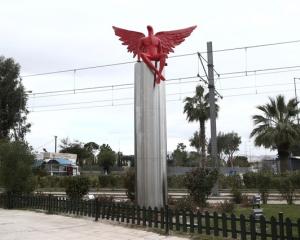Hours after Greek police clashed with black-clad demonstrators outside parliament, all 154 of the ruling Socialist PASOK party's lawmakers voted in favour of the measures, which must secure a second vote on Thursday before the new wave of austerity is enforced.
The view of the ancient Acropolis was obscured by smoke from burning piles of rubbish and a bank building was evacuated after being set on fire by petrol bombs as a strike called by Greece's two main unions degenerated into violence outside parliament.
Much of the country was shut down by the 48-hour general strike, the largest since the outbreak of the crisis two years ago with government departments, offices and shops closed and at least 100,000 people taking to the streets of Athens.
"It's one of the biggest demonstrations in recent years. People showed they were determined to protest against these policies," said Mary Bossis, international security professor at the University of Piraeus.
"We are not done with these protests. We've reached a point where people don't feel the government represents them any more, they want a complete change," she said.
Prime Minister George Papandreou, trailing badly in opinion polls, appealed for support from Greeks on the latest measures which include tax rises, wage cuts and public sector layoffs.
But the mood was furious among demonstrators, fed up after repeated doses of austerity and increasingly hostile to both their own political leaders and international lenders demanding ever tougher measures to cut Greece's towering public debt.
"Who are they trying to fool? They won't save us. With these measures the poor become poorer and the rich richer. Well I say: 'No, thank you. I don't want your rescue'," said 50-year-old public sector worker Akis Papadopoulos.
The boom of tear gas canisters fired by police rang out, and black clouds of smoke from petrol bombs hung over Syntagma Square, scene of violent clashes between police and demonstrators at anti-austerity protests in June.
The latest outbreak of violence overshadowed the start of the 48-hour strike. After hours of clashes with a hardcore group of mainly young demonstrators, police cleared the square.
Groups of hooded youths continued to clash with police on side streets around the city.
At least seven people were taken to hospital and there were several other injuries reported, mainly breathing problems, minor burns and head wounds. Police said 28 protesters were detained and 25 police officers were injured.
Clashes also marred demonstrations on the island of Crete, where more than 20,000 gathered to protest the bill, and the cities of Thessaloniki, Volos, Lamia and Patras, police said.
In Athens, where more than 7000 police were dispatched to deal with possible trouble, many shops boarded up their windows but at least three banks and three hotels were damaged.
Wednesday's action came as European Union leaders were scrambling to settle a new rescue package in time for a summit on Sunday that hopes to agree measures to protect the region's financial system from a potential Greek debt default.
"We are in an agonising but necessary struggle to avoid the final and harshest point of the crisis," Finance Minister Evangelos Venizelos told parliament. "From now and until Sunday we are fighting the battle of all battles."
Trapped in the fourth year of deep recession and strangled by a public debt amounting to 162 percent of gross domestic product, which few now believe can be paid back, Greece has sunk even deeper into crisis.
Papandreou's narrow four-seat majority is expected to be enough to ensure the austerity bill goes through but his Socialist party's discipline is increasingly strained with one deputy resigning his seat in protest. At least two others threatened to vote on Thursday against part of the package dealing with collective wage bargaining agreements.
After repeated rounds of austerity measures, which have hit middle class Greeks hard, protesters said new cuts would only drive the stricken economy deeper into the ground. Unions urged deputies not to pass the law.
"If they have any humanity, decency, sense of pride and Greek soul left, they must reject the bill," said Nikos Kioutsoukis, a top official in private sector union GSEE which is leading the strike with its public sector counterpart ADEDY.
Speaking in parliament on Wednesday, Dimitris Reppas, minister for Administrative Reform, reflected the increasing sense of isolation among many in the ruling party, complaining he felt as though he had been thrown to the lions.
"In government, we often feel like ... we are in the Colosseum, fighting the debt monster while everybody else is just sitting in the stands, watching and commenting," he said.
Parliament cleared in principle the overall bill, which mixes deep cuts to public sector pay and pensions, tax hikes, a suspension of sectoral pay accords and an end to the constitutional taboo against laying off civil servants.
A second vote on specific articles is expected some time on Thursday and only after that will the bill become law.









